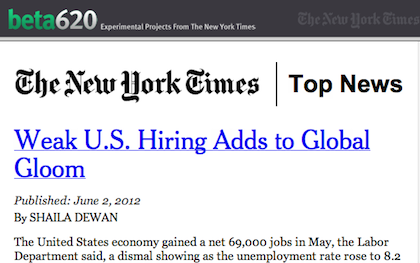Back in April 2009 I listened as a group of bloggers at the G20 protests in London sent in reports using the new Audioboo iPhone application. The rules of the game are clearly changing fast, I thought.
The application allows users to record and upload high-quality sound files in an instant. In the same way that a photo of a plane floating in the Hudson river circumvented traditional channels and made its way around the world online, journalists (including Guardian staff) and bloggers on the ground were able to instantly upload reports on the unfolding activity with the immediacy and colour of front-line reports. I happened to be home ill that day and listened to the action with fascination. Then a contact from ABC News in the States contacted me via Twitter asking me if I knew any of the reporting bloggers and to pass on the direct number of the ABC newsroom. It was quick, energised and direct, and I was immediately hooked.
On the surface, the domain of the journalist and the developer seem poles apart. Journalists trace and shape stories, uncover information, and on a good day bring hidden truths to light. Developers build tools, marshal data and on a good day make the impossible possible. But a convergence is taking place that will ultimately rewrite the rulebook for both camps. Journalists have long been sifting and filtering forbidding mountains of data, looking for a story in the noise. Now they are going further, familiarising themselves with the tools to cohere and present this data, adapting to remain relevant in the new digital space. Developers in turn are doing far more than pushing data around. With rich social media tools and networks available to all, they are starting to report, telling stories with code and changing the way people in the online world relate, work and communicate. It’s a vast social experiment taking place in the production environment of the real world.
Back in March of this year, a small group of developers and journalists met in a pub in Islington to explore this overlap between coding and journalism in an intensely pragmatic fashion – the former teaching the latter the rudiments of web programming over a few beers. Ruby In The Pub was born.
A few days before, I overheard an online conversation between Joanna Geary of the Times and self-proclaimed ‘relapsed blogger’ James Ball. They were discussing the possibility of starting a regular event to get developers and journalists together. They touted Ruby as a possible language and with a speed typical of events incubated in social media circles the venue was sourced and the date decided.
As a Ruby developer (with the penchant for the odd beer) I immediately decided to attend and offer whatever support I could. The first event was warm and freestyle in nature, and the second drew a significantly larger group to the Shooting Star in Spitalfields, including the lead developer of the New York Times. One whole side of the pub was taken over by laptops and energised conversation. Due to the spotty wifi, I hardly managed any teaching at all, but became engaged in a wider discussion around journalism, the digital arena, and the changing media landscape.
Like that difficult third album, the next meet-up will probably define the future of this freestyle session. Ideas will gain traction, people will gravitate to familiar faces or pick up on projects that have been discussed. Karen Barber of Audioboo will be in attendance and has already taken up my offer of help on a project she has been kicking around for a while. We’ll get a drink, sit down, and start building it, responding to feedback from newbies and experienced hackers as we do so. Along the way, the communication channels between both sides will be strengthened and clarified and, what with all the activity on Twitter around the event, feelers of energy will spread out and spark up satellite meetings.
In fact, this has already happened. Paul Bradshaw, a journalist who teaches the MA in Online Journalism at Birmingham University, has already activated the wonderfully-named Ruby Tuesday up North and hopefully we’ll see a lot more. In a series of regular posts I will attempt to cover the process as it unfolds, as well as looking at the wider interface between word and code.
There’s no end to this journey, it’s a vibrant buzz of collaboration and exploration. Why not join us?

